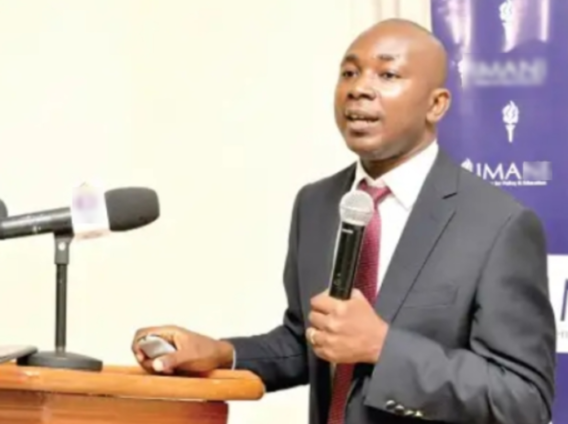Professor of finance at the University of Ghana Business School, Godfred Bokpin says the content of the International Monetary Fund (IMF) programme Ghana has signed onto will leave the country worse off.
According to him, as in 2019, although Ghana went to the Fund under better conditions compared to 2023, the country's exit aggravated her economic woes.
A similar fate, he noted, might be replicated in the current programme.
“When Ghana signed up for the sixteenth IMF programme, there was a lot of optimism. Even at that time, inflation wasn't up to 20%, and one of the key programme objectives was debt sustainability. But we exited that programme after one year extension in April 2019, with debt still being unsustainable.
“So what I'm saying is that the programme approval represents positive news, but it's not an end in itself. If you read through the programme totally, it will only return us faster to the IMF right after the programme exits,” he said.
Speaking to JoyNews on Friday, he explained that Post-Covid-19 Programme for Economic Growth (PC-PEG) designed by the government for the IMF deal, was not an automatic way of stabilising the economy.
“If a programme is designed under fiscal consolidation that is heavily predicated on revenue handles, it tells you it's not sustainable. It tells you that the level of sacrifice by private sector and households in the immediate in order to restore macroeconomic stability will weigh heavily on the country post-programme.
“If you want to scale up your tax GDP ratio from below 13% to 18.2% in three years, it tells you the level of cashflow sacrifices that businesses and households have to make,” he said.
Professor Bokpin quizzed “How would this programme implementation lead to job-rich growth? How would the implementation of the measures in the programme lead to poverty reduction? And then how would it narrow inequality? I am not discounting what the IMF has done. What I'm saying is that it will bring macroeconomic stability. But macroeconomic stability is not an end in itself. It's only a means to an end.”
The Bank of Ghana is expected to receive 604 million US on Friday, May 19, which is the first tranche of the International Monetary Fund’s 3 billion dollar bailout to Ghana.
Governor of the central bank of Ghana, Dr. Ernest Addison noted that the money would boost the country’s reserves and the Cedi which is already doing very well in recent times.
The IMF deal expected to restore confidence in the economy however has far-reaching consequences for the ordinary Ghanaian and businesses.
Also, a lecturer at the Department of Finance at the University of Ghana Prof. Lord Mensah said government's programme was poorly negotiated and might have negative impacts.
“I Have read the IMF release. And when you read that release, you will not be in doubt that this programme is poorly negotiated. This programme had no focus from Ghana. This programme at best was akin to a lobbyist activity by the Finance Minister who single-handedly was roaming within the corridors of IMF and roaming within the corridors of the Paris Club. Just to get this programme through.
“You cannot tell anybody what was government programme and what was on the table. There's nothing like that. And so you've ended up with the IMF basically technically designing a programme and giving it to us because we just didn't have any direction. And the issues that have been raised in that document are so daring that I tend to say that we are in a very difficult position,” he said.
Prof Mensah stressed that Ghana’s economic woes were worse than what the government had initially touted.
“The pill is a lot bitter than I have known. Of course, don't forget that this is the first time we've gone to the IMF basically not even being compliant with the debt sustainability situation of the IMF and the IMF's own report. If you read in the early paragraphs, (it) makes it very clear that COVID-19 took advantage of the pre-existing vulnerabilities of the economy.
“It wasn't COVID-19 that was a problem. It is simply that at the time COVID-19 came, we were suffering from heightened fiscal and external vulnerabilities. And these were matters that we had raised for a very long time. And they didn't work with them until COVID came, took advantage of these vulnerabilities, and hurt us,” he lamented.
Latest Stories
-
CPP files injunction to halt Ejisu by-election
17 mins -
GRA clarifies status of resident individuals for tax purposes
26 mins -
Minority criticises Energy Minister for lack of leadership amid ‘dumsor’
33 mins -
Ghana’s cocoa farmers lament low earnings amid high prices
2 hours -
Rainstorm caused power outages in Greater Accra Region – ECG
2 hours -
KODA’s family requests for privacy ‘to mourn and heal’
2 hours -
Kofi Adu Domfeh writes: When roads are constructed to kill
3 hours -
CAF Confederation Cup semi-final: We have the advantage – John Antwi
3 hours -
I hope that we’ll find a miracle – Céline Dion details Stiff Person Syndrome diagnosis
4 hours -
Government’s silence on energy crisis demonstrates a lack of leadership – Agyemang-Duah
4 hours -
Philipa Baafi bounces back with ‘Eda Ho Pefee’
4 hours -
Amazon Web Services and AmaliTech collaborate to train more than 5,000 people in cloud computing in Ghana
4 hours -
Inflation to decline to 24.6% in April 2024 – Report
4 hours -
Dancehall Queen Aklerh thrills patrons at EP listening
4 hours -
Bond market: Total turnover upturned to GH¢1.14bn
4 hours

